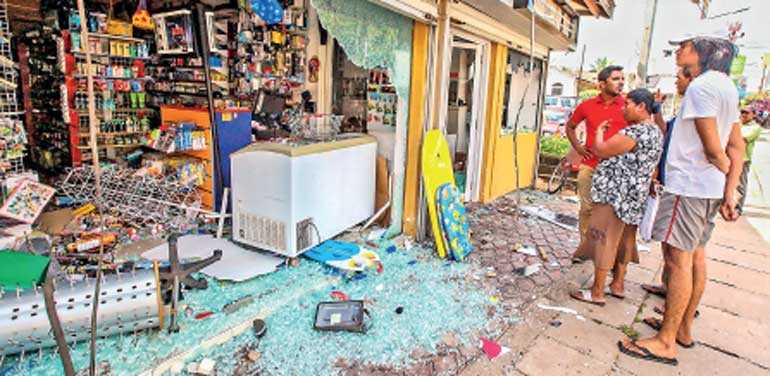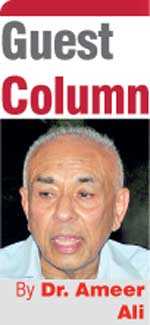Sunday Feb 15, 2026
Sunday Feb 15, 2026
Thursday, 23 May 2019 01:30 - - {{hitsCtrl.values.hits}}

“The immediate task for the Government is to guaranty the safety and security of all innocent Muslims and prevent a recurrence of 1983 … One cannot eradicate one evil with another” – Anatomy of an Islamist Infamy (III), CT, 9 May.
In this, the Government failed to take prompt action just as it failed to prevent the Easter massacre by ignoring all warnings. How can a Government tolerate parliamentarians who mobilise thugs to destroy properties and business establishments belonging to ordinary Muslims who had nothing to do with the massacre, and make political capital out of it?

How can it tolerate black sheep in the Police and Army who looked the other way when those goons were burning properties and desecrating mosques? And how can the Sangha allow a handful of its members advocate hatred against fellow citizens?
Hundreds of thugs involved in the riot are reported to have been arrested and videos of Bhikkus spreading hatred have been released, but there is no guarantee that they would be brought to justice. The same parliamentarians who hired those thugs will pressure the President to release them to be redeployed. Will the Sangha cleanse itself of its undesirable elements?
Reports also tell horrendous stories about how security forces had behaved in carrying out their duty. There is no question that all those who were involved in the Easter massacre, directly or indirectly, should be caught and brought to justice. Security forces have every right to search nook and cranny of all suspected places to gather evidence.
However, those armed men and women should have been instructed by their superiors to be mindful of the sensitivities of local people when entering sacred places like mosques, churches or temples. They should not ransack those places and show disrespect to things and symbols worshippers venerate.
For instance, when the Australian armed forces were preparing to join the multinational force in Afghanistan and Iraq in early 2000s, I was invited by the HQ to conduct a couple of sessions with the infantry in educating them about dos and don’ts when dealing with Muslims and entering their homes and mosques. Of course, that was a case of mostly Christian foreigners entering a Muslim country.
In the case of Sri Lanka, however, the Army and Police are fellow citizens and their misbehaviour or insensitivity shows how ignorant are the citizens about each other’s religion and culture. It is this ignorance, promoted not insignificantly by the national education system that lies at the bottom of many inter-communal and inter-religious issues that crippling Sri Lanka.
Time for serious soul searching
In the aftermath of the Easter infamy, the time has come for the nation to sit back and do serious soul searching if it were to recover its glorious Buddhist past and cherish its pluralist identity. It is wrong to blame an entire community for the lunacy of a few, and it was such blanket condemnation, suspicion and hardline approach that led to an escalation of terrorism and rise of the lone wolf phenomenon in the West. Since jihadist terrorism is a new variable in the Sri Lanka’s security equation there are lessons to learn from the mistakes of the West.
No one can dispute the fact that Sri Lanka is a Sinhalese Buddhist country, but is also a democratic polity with a plural society. Sri Lanka’s Buddhist and plural identities are historically determined and naturally inseparable. It is the mismanagement of this plurality over the last 70 years or so that has driven this country into a state of political and social abyss, dragging the economy also along with it.
In ‘Sri Lanka’s grand failure’ (CT, 1 November 2017), it was stated that, “The Sinhala-Tamil-Moor-Malay-Burgher ethnic and Buddhist-Hindu-Christian-Islamic religious plural mix is a permanent historical heritage of the country and no amount of legal, constitutional and chauvinistic political gimmicks can succeed in disinheriting it … Unfortunately, the history of post-independent Sri Lanka has been marked by progressive mismanagement of this heritage. Managing this plurality by successive political leaders has assumed … a zero-sum game… where each element of the mix is deem to win only at the expense of the others. There is a lot to learn by the current leaders from the managerial experience of earlier … (monarchs) of Sri Lanka. The pre-colonial economic prosperity and political stability of this island, and happiness of its people hinged largely on the ethnic and cultural tranquillity achieved under their management … It is time that our political heroes who champion the cause of their respective ethnic and religious communities re-read the history of this island. This applies even to a minority of Buddhist monks and other religious leaders who are now scare mongering … (about) … imagined dangers of pluralism. In contrast, what the past teaches is the promotion and preservation of a healthy spirit of cosmopolitanism amidst plurality which was disrupted … during the colonial era. That disruption has been allowed to continue by the new rulers, who (succeeded) the colonialists.”
The nation has to go back to the drawing board and see how it could redeem its lost heritage. What should we do?
Promoting isolation in the name of identity
In the name of national language we have created two communities which do not communicate with each other. We have left that communication to politicians and they deliberately miscommunicate to maintain the status quo. By relegating English to the margin, purely for political reasons, we have deprived our children of an invaluable international link to widen their knowledge and exploit opportunities arising globally.
English may have been the language of the colonialist. But today, it is the lingua franca for global communication, and even members of EU when they meet socially they have no choice but to converse in English. It may sound surprising to some to learn that India today is the second largest English-speaking country in the world. A signboard at the University of Hyderabad for example reads, ‘Department of English and Foreign Languages,’ implying that English is not a foreign language in India. Why are we depriving our children many of whom are exceptionally brilliant to take advantage of this international linkage?
By creating separate schools for separate communities, and allow them to operate with different school calendars, we have also deprived our children and teachers the opportunity to mingle, talk and play with each other. The lessons taught in history, literature and religion for example are aimed not at building a nation but at preserving communal and religious identities.
Why do we name our schools with names that are sometimes unpronounceable by many and are alien to the country? Even our festivals are too religious and do not encourage people of other religions to participate in the enjoyment. We have too many public holidays but is there one that brings the nation together just to enjoy without any communal or religious ambience? Is there a better term to describe this pathetic situation than to call it soft apartheid?
Behind the façade of parliamentary democracy we have succeeded in promoting separate development for different segments of our pluralist polity, and in the name of identity we are promoting isolation.
Identity crisis facing Sri Lankans
There is certainly an identity crisis facing Sri Lankans. Who are the Sri Lankans? Are they Sinhalese, Tamils, Muslims or Burghers first and then only Sri Lankans, or the other way round? Is there anything in the country that brings all of them together?
Let us learn from Singapore about how to build national identity with social pluralism. If the majority is determined to consume the whole then the minority has no choice but to fight for its share. It is that fight, which brought a civil war and also hides behind the Easter carnage.
Economically, the country is in a perilous state. Foreign institutional investors are lacking confidence to bring capital into the country because of ongoing political uncertainty and communal disharmony. The phenomenal increase in the wealth of a few does not trickle down fast enough and sufficient enough to benefit the bottom layers of society, and it is the sufferance of those layers that lies at the bottom of many of the nation’s social evils, including inter-communal violence.
The country needs a radical plan of action to rebuild the nation. That plan should be future oriented rather than focusing on easing the current situation. It cannot be postponed any more, and more importantly, that task falls heavily on civil society leaders and should not be left in the hands of politicians.
(The writer is attached to the School of Business and Governance, Murdoch University, Western Australia.)